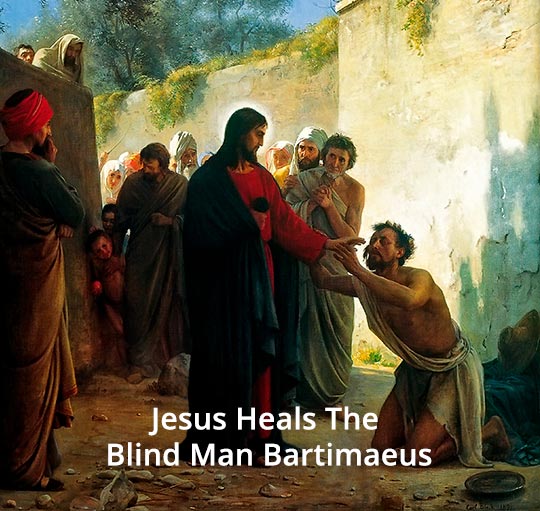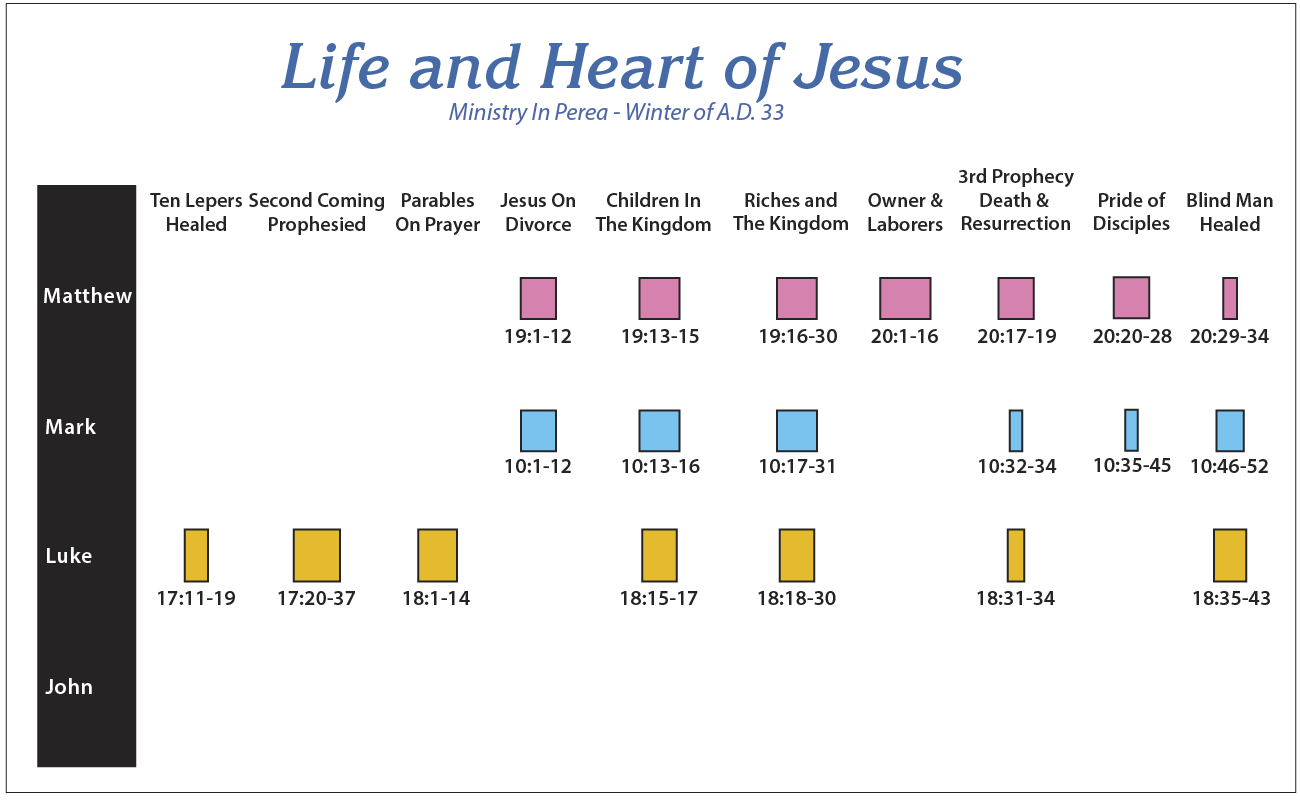
In our last study, Jesus had just rebuked the disciples for their ugly display of pride. I say ugly because that is a good way to describe the blatant attempt by James and John to gain the prestigious position of sitting on the right and left sides of Jesus in the kingdom. They wanted those positions of honor and power, so they asked before the other ten disciples did. When the other disciples discovered what they had done, they were angry. They wanted those positions too! It is sad to see their behavior in the gospels. But as soon as I say that, I do not mean to imply that I have no pride. It is just sad that this incident occurred. It is a warning to you and me about pride. This study is about the next event recorded in Jesus’ life. Matthew, Mark, and Luke tell us that two blind men who were begging to be healed. One was a man named Bartimaeus. In the next study we will learn about a man called Zaccheus. The character of both the blind men and Zaccheus are in sharp contrast to that of the twelve disciples. The twelve disciples were like many Christians. Because they were confident of their salvation, they had moved on to the next important issue. How important would they be in the kingdom of heaven? In contrast, the blind men and Zaccheus were humble. How about you? How would you respond? Our study is about two humble blind men who had faith in Jesus. We are going to learn six important facts about genuine faith. Our study is from Matthew 20:29-34; Mark 10:46-52 and Luke 18:35-43.

Jesus Approaches Jericho
Matthew 20:29 tells us that as Jesus and the disciples are leaving Jericho, a large crowd was following.
As they were leaving Jericho, a large crowd followed Him. Matthew 20:29 (NASB)
But Mark 10:46 and Luke seem to give different reports. Mark 10:46 says that Jesus, the disciples, and the crowd come to Jericho and were leaving.
Then they came to Jericho. And as He was leaving Jericho with His disciples and a large crowd . . . Mark 10:46a (NASB)
That agrees with Matthew, but Luke 18:35 appears to disagree when it says,
As Jesus was approaching Jericho . . . Luke 18:35a (NASB)
“Approaching” is not “leaving.” The solution to this apparent problem is that the Greek word for “approaching” is engizo. The basic meaning of this word is “to be near.” It can be translated as “in the vicinity.” That is, Jesus was moving in the vicinity of Jericho. But more likely, Matthew and Mark referred to the old ruins of Jericho, and Luke referred to the new Jericho. The old original Jericho had been destroyed by the Israelites when they entered Palestine. (Joshua 6). In Jesus’ time the city had been rebuilt just south of the old ruins.[1] So, it is possible that Matthew and Mark referred to the ruins of the old city, and Luke referred to the new city. This would also agree with Luke 19:1 which says that Jesus entered Jericho later and met Zaccheus. Since all of Scripture was written by the Holy Spirit (2 Peter 1:20-21), we know He wrote Matthew, Mark, and Luke. So there is no contradiction in the details. We must discover the facts so that we can understand what they were reporting. The modern-day Jericho was fifteen miles north of Jerusalem.
Two Blind Beggars
Matthew 20:30 tells us that two men were sitting by the road when Jesus, the disciples, and the crowd approached Jericho.
And two blind men sitting by the road . . . Matthew 20:30a (NASB)
But both Mark and Luke do not mention that there were two blind beggars. They just focus on one of the men. The one man they speak of was a blind beggar sitting by the road (Mark 10:46b; Luke 18:35b). Only Mark gives us his name, Bartimaeus, and Luke says he was begging. Bartimaeus was a blind beggar sitting by the road. We do not know anything about the other man, except that he was also blind!
. . . a blind beggar named Bartimaeus, the son of Timaeus, was sitting by the road. Mark 10:46b (NASB)
. . . a blind man was sitting by the road begging. Luke 18:35b (NASB)
Bartimaeus must have been a well-known individual, or he would not have been mentioned by name in the gospel of Mark.

Real Faith Will Focus On Christ
The gospel of Luke gives us the next chronological event. We are told Bartimaeus heard a crowd walking by.
Now hearing a crowd going by, he began to inquire what this was. Luke 18:36 (NASB)
The ears of the two blind men worked very well. They heard the crowd, but they could not understand who was there or what they were doing. So, the two men, especially Bartimaeus, asked what was happening. Both the gospels of Matthew and Luke tell us that the crowd said Jesus the Nazarene was walking by them.
. . . hearing that Jesus was passing by, cried out, . . . Matthew 20:30a (NASB)
They told him that Jesus of Nazareth was passing by. Luke 18:37 (NASB)
We can imagine the panic that must have gripped the blind men when they heard that Jesus had not stopped, but He was walking past them. Their opportunity for healing was walking by them. Maybe Jesus had already walked too far away for Him to hear them? So, what would you do if you were blind and could not see if He was near or far away? All three gospels tell us both men shouted as loudly as they could asking for mercy.
Matthew and Mark use the Greek word krazo to tell us the blind men “cried out.” The word reveals that they spoke very loudly. But the gospel of Luke uses the Greek word boao, which literally means to “shout or scream.” That is, at least one of the blind men, Bartimaeus, was screaming as loudly as he could. There have been moments in life, when we shouted loudly. He did not want to miss this opportunity to be healed. Jesus had not stopped to talk with them. Jesus was walking past them. They did not know how far away or how close He was to them. This opportunity to be healed might never occur again.
So, Bartimaeus shouted as loudly as he could in order to be heard above the noise of the crowd. We can imagine the blind man’s emotional panic. Jesus was walking away! So loudly, they begged for mercy and called Jesus the Son of David.
. . . cried out, “Lord, have mercy on us, Son of David!” Matthew 20:30 (NASB)
When he heard that it was Jesus the Nazarene, he began to cry out and say, “Jesus, Son of David, have mercy on me!” Mark 10:47 (NASB)
And he called out, saying, “Jesus, Son of David, have mercy on me!” Luke 18:38 (NASB)
In his desperation, the blind man’s shouting revealed that he believed in Jesus. He was like the soldier in the trench in the midst of a fierce military battle. A man once said there are no atheists in the foxholes during a war when bombs are dropping nearby. It is easy to be an atheist when you are eating a meal in the comforts of your home and enjoying yourself. It is just theory to claim that God does not exist when you cannot see Him and you think you are in control. But when your life is in danger and you cannot help yourself, then what you really believe is revealed. When someone’s child is about to die and no one else can help, then the true beliefs of a person are revealed.
People reveal that they do really believe in God when they are in a helpless situation. This blind man’s faith was revealed in his desperation. He did not just shout; he screamed for help! A man or woman who desperately believes in God, will pour out their heart to Him when they finally realize that no one in this universe can help them. That was true of Bartimaeus and the other blind man.
Matthew, Mark, and Luke tells us that when the men cried out, they called Jesus the Son of David (Matthew 20:30; Mark 10:47: Luke 18:38). The gospels reveal that other people also called Jesus the Son of David when they asked Him for mercy. Son of David had two meanings. First, it referred to a descendant of David (2 Samuel 13:1; 1 Chronicles 29:22; 2 Chronicles 1:1; 11:18; 13:6; 30:26; Proverbs 1:1; Ecclesiastes 1:1). The blind men were correct. The genealogies of both Joseph and Mary reveal they were descendants of King David (Matthew 1:1, 20; Luke 3:23, 31-32). The term also referred to the Messiah (2 Samuel 7:8–16; Matthew 12:23; Revelation 22:16). The Messiah was prophesied to be a descendant of King David.
It is obvious that they used Son of David with a second meaning, because no ordinary person could do the thousands of miracles that Jesus did during His ministry. It is clear from Matthew 12:22-23 that when Jesus cast out demons, that the people thought He was the Son of David or the Messiah. The gospels of Matthew, Mark, and Luke reveal that when people begged Jesus to heal them, they called Him the Son of David (Matthew 9:27; 15:22; 20:30-31; 21:9, 15; Mark 10:47, 48; 12:35; Luke 18:38-39). So they shouted loudly and begged, “Jesus, Son of David, have mercy on me!” They believed Jesus was the Messiah and that He could heal them. This reveals these two blind men believed in Jesus. That was their first step to being healed. This gives us our first important fact about faith. Real faith focuses on Christ and upon who He is!
Oh, if only we were like these two blind men when we have problems. The great lesson for us to remember is that when we are blind to the solution of our problems, we should cry out to our Savior! While the blind men did not know if Jesus would hear them, we know that our Savior hears every believer when we pray. In addition, 1 Peter 5:7 reminds us that we are to cast all of our care upon God because He cares for us! These two blind men did not know what was going to happen, but we do! Their faith was focused on Christ.
Faith Will Persist
The next important fact about faith is that it persists. Next we are told the crowd objected to their shouting. I imagine that some of us might have objected to the shouting too! Most likely their shouting was a ten on the scale from one to ten! I doubt that these men were shouting at six on the scale. I doubt they were shouting at eight either. This was their once-in-a-lifetime to be healed and so they were shouting as loudly as they could. So, the crowd did not like the screaming! All three gospels focus on this fact. The gospels tell us the crowd “sternly” told them to be quiet.
The crowd sternly told them to be quiet, but they cried out all the more, “Lord, Son of David, have mercy on us!” Matthew 20:31 (NASB)
Many were sternly telling him to be quiet, but he kept crying out all the more, “Son of David, have mercy on me!” Mark 10:48
Those who led the way were sternly telling him to be quiet; but he kept crying out all the more, “Son of David, have mercy on me!” Luke 18:39 (NASB)
The Greek word for “sternly” has the sense of a rebuke with a threat of penalty. But these two men ignored the threat and cried out “all the more” or greatly. This seems to mean that they cried more eagerly and constantly. What an irritating experience that must have been for the crowd. I can imagine how I would feel if someone was screaming in my ear.
But we must not miss a spiritual truth. They persisted screaming greatly because they believed Jesus Christ was really the Messiah. Real faith persists. Real faith grows stronger due to conflict. Oh, it may waver briefly like a flag blown by the wind, but it will never become detached from the pole. So, real faith focuses on Christ. Also, real faith never detaches from Jesus. Instead, it grows stronger.
Faith Obeys Christ
The next important fact about faith is that it obeys. Now Jesus commanded the two blind men to come to Him. I believe that Jesus commanded them to come so that we could see that real faith obeys. The gospels tell us,
And Jesus stopped and called them . . . Matthew 20:32a (NASB)
And Jesus stopped and said, “Call him here.” So they *called the blind man, saying to him, “Take courage, stand up! He is calling for you.” Throwing aside his cloak, he jumped up and came to Jesus. Mark 10:49-50 (NASB)
And Jesus stopped and commanded that he be brought to Him . . . Luke 18:40a (NASB)
The gospel of Luke says that Jesus commanded that Bartimaeus be brought or led to Him. Mark tells us that the crowd called him. This seems to be the correct understanding of “brought” to Him. So, Bartimaeus threw aside his cloak, jumped up and walked to Jesus. While Matthew does not say anything about the other blind man, it will become obvious that he came too! These two blind men are examples of real faith. Real faith focuses on Jesus. Real faith persists, and real faith obeys.

Faith Asks Christ
Real faith also asks for help from the one in which he or she trusts. These two blind men are examples of that fact too! The three gospels tell us that Jesus asked them, “What do you want Me to do for you?” Notice how the men answered Jesus.
And Jesus stopped and called them, and said, “What do you want Me to do for you?” They *said to Him, “Lord, we want our eyes to be opened.” Matthew 20:32-33 (NASB)
And answering him, Jesus said, “What do you want Me to do for you?” And the blind man said to Him, “Rabboni, I want to regain my sight!” Mark 10:51 (NASB)
. . . and when he came near, He questioned him, “What do you want Me to do for you?” And he said, “Lord, I want to regain my sight!” Luke 18:40b-41 (NASB)
Apparently, one man asked, “Lord, we want our eyes to be opened,” and Bartimaeus himself said, “Lord, I want to regain my sight!” One can feel the emotion and high energy these two blind beggars put into their request. After their shouting and being told to be quiet by the crowd, they asked Jesus to help them to see again. They did not ask the crowd. They did not ask each other. They asked the Son of David, their Messiah to heal them. They knew their only hope to be healed was through Jesus Christ.
The same is true for us even today. We usually visit a hospital or a doctor when we are ill. We hope they can make us well. But we forget the principle that is given to us in Psalm 127:1. The principle is that unless the Lord heals us, the medical personnel are working in vain. It says,
Unless the LORD builds the house,
They labor in vain who build it;
Unless the LORD guards the city,
The watchman keeps awake in vain.
Psalm 127:1 (NASB)
This verse reminds us that God is total control.
The Holy Spirit has also told us in James 5:13-17 to call the elders when we are sick, and have them pray for us. But notice that verse 13 reminds us that it is not the elders, nor their faith that alone heal, but it is the Lord who heals us, if He wills to do so.
And the prayer offered in faith will restore the one who is sick, and the Lord will raise him up, and if he has committed sins, they will be forgiven him. James 5:15 (NASB)
Just like the two men, they shouted. They screamed to be healed. They asked their Messiah to heal them. He was the only One who could heal. His name is Jesus Christ, our Savior, Lord, and God. So, real faith focuses on Jesus. Real faith persists. Real faith obeys, and real faith always seeks help from the only One who can help.
Faith Results in Salvation
Next, we discover that faith in Christ saves. Matthew 20:34 reveals that Jesus was moved with great emotion toward these two men. I think He was moved because He knew they greatly believed in Him. The Greek word that describes Jesus’ emotion actually refers to a person’s bowels.
Moved with compassion, Jesus touched their eyes . . . Matthew 20:34a (NASB)
It tells us that Jesus felt emotion for these men deep inside His bowels. We experience this occasionally. When we love someone or are moved emotionally toward a person, we feel it in our abdomen. That is the same thought as the Greek word that describes how Jesus felt toward these two blind beggars who were pleading for help! They were acting this way because they had faith in Jesus!
The NASB’s Greek translation in Mark and Luke leave us with the wrong idea as to what Jesus said. Mark 10:52 says that Jesus told them their faith had healed them.
And Jesus said to him, “Go; your faith has made you well.” Mark 10:52a (NASB)
But the translation of Luke 18:42 is a little different. It says that the men were healed and saved.
And Jesus said unto him, Receive thy sight: thy faith hath saved thee. Luke 18:42 (NASB)
But an accurate translation of both Mark 10:52 and Luke 18:42 reveals that Jesus used the Greek word, sozo, which means “to be saved.” That is, Jesus announced the men were saved, and also healed. In fact, the tense of “to be saved” is the perfect tense. That reveals these men had already believed in Jesus, and as a result were already spiritually saved. Then Jesus healed them.
Faith and salvation occurred together and then their healing followed. This passage does not teach that these men were healed because of their faith. Instead, the passage teaches that they were saved because of their faith, and then Jesus healed them because He was moved with compassion.
Faith Follows
Then immediately after Jesus touched their eyes and said, “Receive thy sight,” they were able to see. Now some men during Jesus’ ministry just walked away. But not these two men. Notice what each gospel says,
. . . immediately they regained their sight and followed Him. Matthew 20:34b (NASB)
Immediately he regained his sight and began following Him on the road. Mark 10:52b (NASB)
And immediately he received his sight, and followed him, glorifying God . . . Luke 18:43a (NASB)
This is a very special and emotional event. These two men immediately saw their Messiah, the One in which they believed. Contrary to the teaching of some today, they did not have to wait for the healing to occur. They did not have to imagine they were healed. We are told immediately they received their sight, like the snap of two fingers. As a result they followed Christ.
We have learned six important facts about real faith. First, real faith focuses exclusively on Jesus. Second, real faith persists. Third, real faith obeys. Then real faith always seeks help from the only One who can help. Fifth, real faith saves the sinner for a salvation that is guaranteed. Sixth, real faith submits and humbly follows. These two men followed Jesus on the road to Jerusalem. I wonder if they watched Him when He was crucified? Is that why Bartimaeus’ name is recorded?
Finally, the people saw this amazing miracle and glorified God.
. . . and all the people, when they saw it, gave praise unto God. Luke 18:43b (NASB)

Conclusion
I look forward to the day that I can see Christ in heaven. These men saw Him when He walked among us. They are a picture of what it will be like for us some day when we see Jesus. Because we have already believed in Jesus, we are saved, and our salvation is secure (1 Peter 1:3-9). Because of our position in Christ, we are already sitting in heaven (Ephesians 2:6). Some day our long wait will be over.
So, we have learned six important characteristics of faith this passage. How does your faith in God measure up? May I urge you, figuratively speaking, to get out your ruler and measure your faith? These blind men had real faith that humbly clings to Jesus, persists, obeys, always seeks, clings to Christ for the forgiveness of sins, submits and humbly follows! Do you?
Reference:
1. Flavius Josephus. Wars of the Jews. Book IV. Chap. 8.3. Kregel Publication. 1963. p. 539.